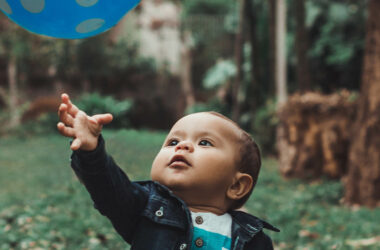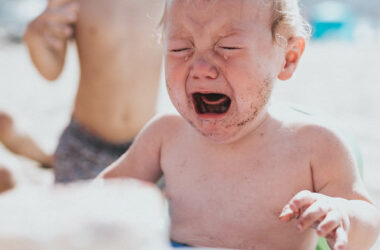Your baby and the fear of strangers and separation anxiety
For around seven months, your baby was the world’s biggest people lover. If someone smiled at him or her, they received a smile in return. If you had to walk away for a moment to get something, your baby patiently waited until you returned. But then all of a sudden, your baby has started getting clingy and experiencing separation anxiety.
Leave the room for just a moment and your baby starts crying uncontrollably. If a stranger comes close, your baby gets frightened to death. Welcome to the clinginess and separation anxiety phase!
Leap 5: mum and dad need to stay with me!
When your baby experiences leap 5, the leap involving relationships, at around 26 weeks after the due date, he or she understands for the first time that the distance between things does not always stay the same – and that the distance between people can become larger or smaller. For the first time, your baby understands that mum or dad can change the distance between you and him or her. In other words, your baby is all alone!
Discover and stimulate your baby's mental development
Download nowSince your baby is not yet able to physically move towards other people, he or she realises that mum or dad is the one who decides when this distance becomes greater. He or she has no say in this and that is frightening. The result is a shriek and crying.
In our app, you can find out exactly when your baby hits this phase of clinginess and separation anxiety. Including handy tips!
Fear of strangers as a step forward
When your baby suddenly becomes clingy, it may seem as if he or she has taken a step back in development. But quite the opposite is true. Now that he or she understands what distance is, your baby also understands that mum will not always be there. Mum or dad can actually leave, can walk away from him or her, leaving the baby ‘all alone’. This is frightening because your baby subconsciously knows that he or she is dependent on mum or dad. This fear turns to panic. Babies panic when a parent walks away because they understand the possible consequences. In other words, your baby understands much more than you may think. So, for all intents and purposes, clinginess is a huge step forward – even though it may not always feel this way for the parent.
Clinging to mom or dad?
The majority of babies tend to cling most to their primary caregiver. If a baby sees mum most often, he or she will cling to mum, but if he or she sees dad more often, the baby will usually cling to dad. During the first year in particular, babies cling to the most important persons in their lives. The more time you spend with your child, the more attached he or she will become to you. According to attachment theory, babies can attach just as easily to their father as their mother. So, the person the baby sees most often plays a role, but what also plays a role is which person is most sensitive to the baby’s signals. The one parent may pick up on these signals faster than the other and your baby is sensitive to this. Not surprisingly, your baby will prefer to be cared for by the parent who picks up his or her signals fastest. A preference for mum or dad is often temporary and can also change during the same period.
Help your baby with their separation anxiety
Every child is different and not every child is equally as clingy. The degree of clinginess also depends on how you relate to your baby, as well as his or her character. There is nothing you can do about the latter, of course. By responding to your baby’s new separation anxiety in a playful way, you can help him or her to understand more quickly that you may be out of sight sometimes, but that you always return.
Tips:
- Tell your baby you are about to leave for a moment, tell them what you are going to do and that you will come back.
- Play ‘peek-a-boo’ more often, using toys and also yourself.
- Continue to talk or sing when you are out of sight. Then baby knows you are still around.
- Never just sneak off, even if you find it hard to deal with their tears. Say goodbye quickly and lovingly. And if baby is crying because they are upset that you have left, make sure there is someone there who can tell them that you will return.
- The most important tip we can give you is to take the separation anxiety seriously and do not make fun of it or trivialize it.
Facts in a row: fear of strangers…
- … can start from leap 5: the world of relationships (6 months)
- … is at its peak between 8 and 18 months
- … can sometimes last until your child is 3 years’ old
If your curiosity has been sparked and you want to know all about the 10 leaps, the fussy phases, and all the accompanying skills, download our app now!
Did this article help you?
Share this article
Receive a notification at the start of a leap!
Would you like to be prepared when your baby is about to enter a leap? Sign up for our leap alarm for free and always receive a notification when a leap is about to start!




